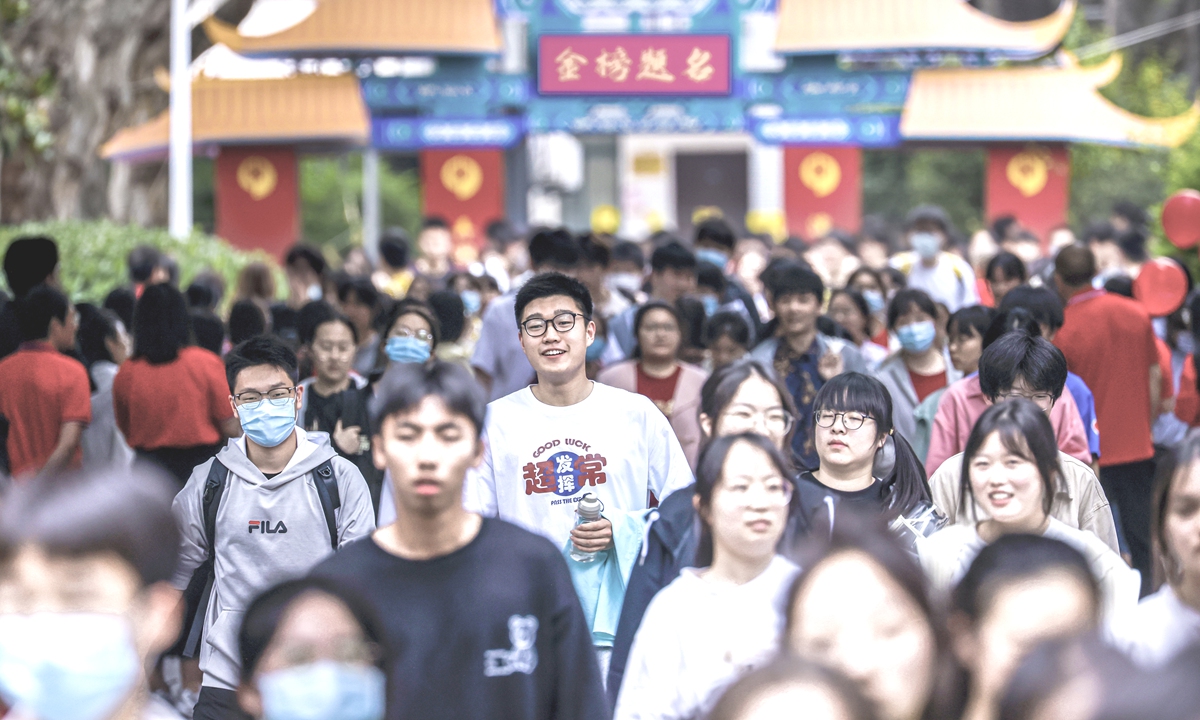
Students walk out of the exam hall after taking the gaokao at the No. 9 Middle School test center in Nanjing, East China's Jiangsu Province on June 7, 2023. Photo: VCG
A month after sitting China's college entrance exams, known as
gaokao, which set a record of 12.91 million students participating this year, students are making a crucial decision - "which university and what major should I choose," which would largely decide their following four years, their future career and their style of life.
Against the backdrop of youth unemployment standing as high as 20.8 percent reported in June, the pressure of securing a job has been felt at least four years earlier by the freshmen who carry both a rosy imagination and anxiety about the future when entering university campuses.
For the vast majority of children from Chinese families, going to university is the best chance to change their lives. And a decent career through a university education is also how most students will accumulate future wealth. That is to say, choosing a major is increasingly important for future career development.
Public attention in the past few weeks has also focused on Zhang Xuefeng, an education blogger whose "sharp" comments on choosing majors has stirred public opinion. Widespread support for Zhang's "useful suggestions for students from modest families" versus fierce criticism of his "being overly utilitarian about university's functions," has reflected the young generation's struggle of realizing personal goals along with China's socioeconomic transition.
With China's development pace has slowed down and the target shifting to high-quality growth, some industries have been losing motivation while new opportunities are emerging. Young people, acknowledging the challenges they face, are now actively planning their future with diverse possibilities.
At the crossroads When Zhang Xuefeng suggested students not study journalism and philosophy which are "not competitive in job market" or finance which "requires more than a degree," he is speaking to youth who might be the first college student in their family in generations and shoulder the responsibility of sustaining their family as soon as possible after graduation.
Zhang's tips reveal some hidden thresholds and help those students better understand the gap between a diploma of certain majors and success in future career which one cannot easily cross over.
With college major consultancy having become a market worth an estimated 950 million yuan ($131 million), according to iiMedia Research, many of the 12.91 million test takers and their families do appreciate Zhang's free, online sharing.
Critics said Zhang sees university only from a utilitarian perspective and his principle is simply "staying away from majors that cannot secure a job with good salary." The young people have infinite possibilities; their most vibrant and energetic years should not be restricted on how to find a job; and salary should not the only barometer for a successful career, some said.
Supporters and opponents of Zhang are not debating on one or several specific majors, but what higher education could and should offer, and what young people could and should get from it, according to educators.
"If I wanted to make a big fortune, I should have studied science in high school," 18-year-old Shen told the Global Times.
Shen convinced her parents on the decision of studying history, a major "neither practical nor money-making."
Changing reality History is a major Zhang warned against. Shen, knowing well it's niche and doesn't match any specific profession, nevertheless remained determined to study it mostly out of interest.
Some of Shen's peers have to prioritize return on investment when choose a major because of the economic consideration but there are also some like Shen, whose parents benefited from China's reform and opening-up and mastered resources to allow their children more choices.
Long been interested in Chinese civilization and history, Shen has an ambition for academia.
"But I will not focus solely on history and will make full use of the time to explore other humanities courses, research programs and internships to find what I am passionate about and good at," Shen said.
Also to avoid the situation of students choosing a major that they have little knowledge about, some universities enroll students to broad "fields" rather than niche "majors," such as Tsinghua University, Fudan University and Xi'an Jiaotong University.
Tsinghua University, for example, enrolls students into different institutes which include several related majors in certain disciplines - humanities, basic sciences, sciences plus engineering, to cultivate inter-disciplinary talents.
Students need to study maths, physics and chemistry, sociology, information technology, and economics, as well as mechanics and management, before focusing on a more specific area of interest, the Global Times learned from an enrollment volunteer.
"When China has caught up in industrialization and entered the stage of innovation, in addition to professionals in different fields, we also need innovation leaders whose knowledge, skills and vision transcend professional boundaries," said Ouyang Zheng, subdean of the university.
Undergraduate education has correspondingly shifted from training of professionals to training of talents with liberal and professional education, Ouyang said.
The job market changes really fast and it is hard to predict which major would be popular after four years or longer, a junior student at a university in Beijing told the Global Times on condition of anonymity. Also one should not fix eyes on certain sector that grows at an unusually fast pace, such as the internet a few years ago, as that is not a sustainable mode.
What one should acquire through higher education is a balanced knowledge system and the capability of quick-learning and adapting to changes, the student said.
As college enrollment rate keeps rising, students should not see university as place to get the master key to a good job, but a place to explore their interests and hone their skills that meet society's needs, Xiong Bingqi, director of the 21st Century Education Research Institute in Beijing, told the Global Times.




